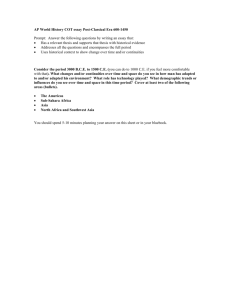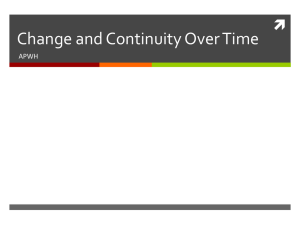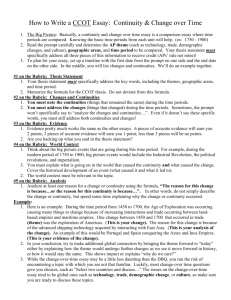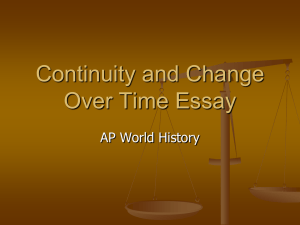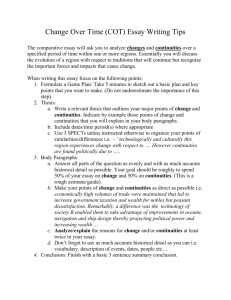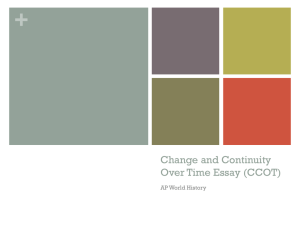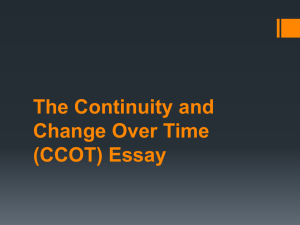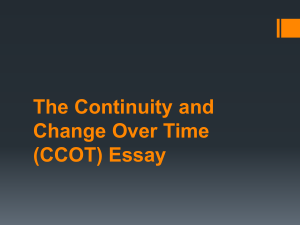Change & Continuity Over Time Essay CCOT
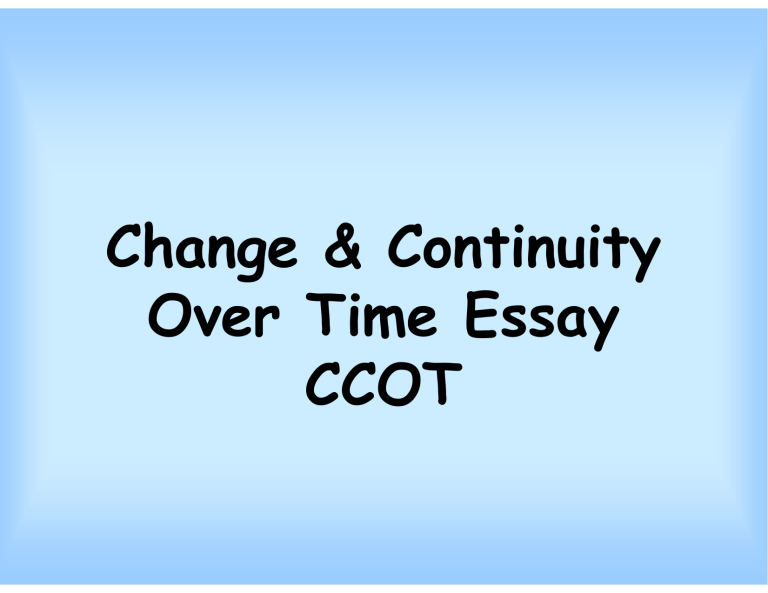
Change & Continuity
Over Time Essay
CCOT
Purpose:
• To evaluate your ability to analyze historical changes and continuities that have shaped events, social, political, economic developments in history and ability to gauge your analysis of global processes.
• This is really a high-level analysis of history.
• This essay question deals specifically with analysis of continuities and changes over time covering at least one of the periods in the course outline. It addresses, for example, technology, trade, culture, migrations, or environment. The continuity and change over time questions require analysis of process and explanation of causation with specific examples.
What you need to be able to do:
Change
- Recognize it as it occurs in history.
- Identify & Understand the causes of change
Continuity
-Recognize factors which remain the same throughout an entire period
-Identify & Understand factors which allow this to continue
Changes:
• Must discuss, utilize concrete detail and analyze changes that occurred relevant to the prompt and correctly!
• If the prompt discusses command terms
(social and political) you need to focus on political and social changes.
• If your prompt is more vague, you need to think of aspects to base your analysis
• by the end of the course we will have regional CCOT charts!
Continuities
• The prompt also asks you to address continuities, generally these are patterns or cultural tendencies that remain stagnant for years and years.
• Example: Think of role of women, religions, philosophies or clash/conflict between the social classes.
• You need to have concrete detail to back up your continuity however.
IMPORTANT INFO
• IN order to completely get all credit for
CCOT, you need to address the starting point. In order to analyze changes, you must discuss what it was like before.
However, pay attention to time period.
• Thus, given the prompt, your essay may require starting point, transition, ending condition OR
• Starting POINT Ending condition.
• Pre-Write is mandatory for this reason.
The Directions
Directions: You are to answer the following question. You should spend 5 minutes organizing or outlining your essay. Write an essay that:
• Has a relevant thesis and supports that thesis with appropriate historical evidence
• Addresses all parts of the question
• Uses historical context to show change over time and continuities
You must identify the change AND make it clear why that change occurred.
NO Prior to 1948 the Jewish people had no homeland. In 1948, Israel was established.
YES In the Early 20 th century, few people saw a need for the establishment of an independent
Jewish state. However, once the world realized the massive genocide of Jews that took place during World War II, support for the establishment of Israel began to grow.
BASIC CORE
1) Has acceptable thesis.
(Addresses the global issues and the time period specified.)
2) Addresses all parts of the question (though not necessarily evenly or thoroughly)
•Addresses most parts of the question
3) Substantiates thesis with appropriate historical evidence
•Partially substantiates thesis with appropriate historical evidence
4) Uses historical context effectively to show change over time and/or continuities.
5) Have you analyzed the process of CCOT?
Subtotal
Points
1
2
(1)
2
(1)
1
1
EXPANDED CORE
Points
Expands beyond basic core of 1 to 6 points. A student must earn 7 points in the basic core area before earning points in the expanded core area.
Examples:
•Has a clear, analytical, and comprehensive thesis.
•Addresses all relevant parts of the question: global issues chronology, causation, change, continuity, content.
•Addresses all parts of the question evenly.
•Shows careful and insightful analysis of the documents.
•Provides ample historical evidence to substantiate the thesis.
•Provides connections with relevant ideas, events, and trends in an innovative way.
0-2
7 Subtotal
TOTAL
2
9
• Thesis should define areas of change and areas of continuity. (2 sentences!)
• Address both continuity and change!
Everyone forgets to do continuity.
• Analyze the cause of changes. Use the word “because” a lot.
• Discuss “global context”—connect to world processes and change.
• Draw a timeline to help conceptualize the era and events you will talk about.
• Identify what the situation was at the beginning of the era—a baseline. Cite a fact about this.
• Identify what the situation was at the end of the era—a finish line. Cite a fact about this.
• Try to explain the process of change—how and why did it happen?
• You can think about the CCOT as discussing whether change outweighs continuity, or vice versa.
• You can think about the CCOT as focusing on the cause and/or effects of a primary change in the era.
• You can think about the CCOT as covering 2 or 3 chapters from the textbook—think about how the situation changes.
Terms to use for Changes: previously before until that time up to that time formerly from that point forward over time as things evolved in the [fill in the blank] century then comes the period of time when
[such and such happened].
Terms to use for Continuities throughout this period continued to persistent lasting enduring ongoing constant sustained maintained
Directions: You are to answer the following question. You should spend 5 minutes organizing or outlining your essay. Write an essay that:
*Has a relevant thesis and supports that thesis with appropriate historical evidence
*Addresses all parts of the question
*Uses historical context to show change over time and continuities
• Step 1 Process the question –
What is it asking me to do? Key phrases? What do I know about the subject? Changes? Continuities?
• Step 2 Build a framework –
Maybe a chart or graphic organizer. Be sure to cover all the question asks of you.
• Step 3 Build your Essay –
Choose your parts – Create a thesis – Use topic sentences for each body paragraph.
• Step 4 Write it
Chart
Organizational Options
Country/Region??? (our example: You)
Issue from prompt:
Developments which have occurred?
Impact: What developments occurred? Why & how?
Change: Developments which made things different?
Continuity: Things which remained the same despite/encouraged by developments?
Organizational Options
PERIOD APPROACH
• Beginning
1995
• Middle
2001
• End
2009
Organizational Options
TOPIC APPROACH
• Social
• Intellectual
• Technological
Create Thesis
In the period _______ to
__________, _________ changed from __________ to
____________ and _________ changed from _________ to
__________, while _________ stayed the same.
STRUCTURE
• Intro paragraph with thesis and support info (2 change & 1continuity OR 2 continuity & 1change)
• 3 Body paragraphs. 1 each on major points along with historical evidence and links to global context
• Conclusion restating thesis and showing that you have proved your case
PAST PROMPTS
2009 CCOT
Analyze continuities and changes in patterns of interactions along the Silk
Roads from 200 B.C.E.
to 1450 C.E.
2008 CCOT
Analyze the changes and continuities in commerce in the Indian Ocean region from
650 C.E. to 1750 C.E.
PAST PROMPTS
2007 CCOT
Analyze major changes and continuities in the formation of national identities in ONE of the regions listed below from 1914 to the present. Be sure to include evidence from specific countries in the region selected.
Middle East Southeast Asia Sub Saharan Africa
2006 CCOT
Analyze the cultural and political changes and continuities in ONE of the following civilizations during the last centuries of the classical era.
Chinese 100 600 CE Roman 100 600 CE
Indian 300 600 CE
PAST PROMPTS
2005 CCOT
Analyze the social and economic transformations that occurred in the Atlantic world as a result of new contacts among Western Europe, Africa, and the
Americas from 1492 to 1750.
2004 CCOT
Analyze the changes and continuities in labor systems between 1750 and 1914 in ONE of the following areas. In your analysis, be sure to discuss the causes of the changes and the reasons for the continuities.
Sub Saharan Africa
PAST PROMPTS
2003 CCOT
Describe and analyze the cultural, economic, and political impact of Islam on ONE of the following regions between 1000 CE and 1750 CE.
Be sure to discuss continuities as well as changes.
2002 CCOT
Choose TWO of the areas listed below and analyze how each area’s relationship to global trade patterns changed from 1750 to the present. Be sure to describe each area’s involvement in global patterns around 1750 as your starting point.
Latin America
North America
Sub Saharan Africa
